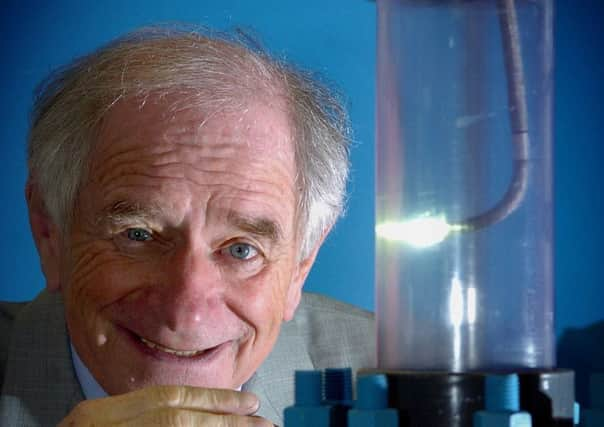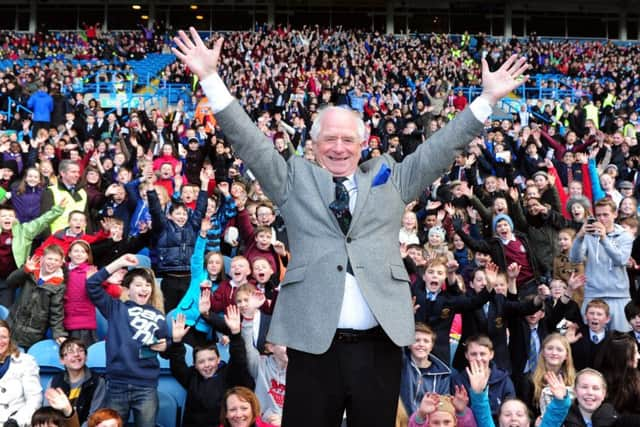Johnny Ball - on maths, children’s TV, being on the Cold War frontline and opening with the Bee Gees


IF, like me, you’re a child of the Seventies, then the mere mention of the name ‘‘Johnny Ball’’ is likely to bring out a smile.
Today, he’s perhaps better known as father of BBC radio DJ Zoe Ball, but to those of you familiar with children’s TV back in the day (and this goes for parents too), Johnny Ball was the bloke who inspired countless youngsters to become interested in maths and science through TV programmes like Think of a Number and Think Again.
Advertisement
Hide AdAdvertisement
Hide AdNext month, Ball is heading to Yorkshire to take part in the Huddersfield Literature Festival (HLF) when he’ll be talking about his book Wonders Beyond Numbers: A Brief History of All Things Mathematical, and shedding light on some of the colourful figures from history.


It’s not, he’s keen to point out, a talk for mathematicians. Maths, he says, should be accessible to everyone. He proceeds to talk about figures he admires (Einstein) and those he doesn’t (Aristotle) and many more in between.
“The oldest known mathematician was Thales and he was the fella who said you can work out the height of a pyramid by its shadow. But he also explained that if your eye is two metres above the waterline down at the beach you can see five kilometres, but to see 10 kilometres you need to be not twice as high, but four times as high. And that is quite complex maths but it also shows that the very earliest mathematicians knew that the earth was round.”
Ball grew up during the Second World War and his fascination with maths dates back to this period. “It all started when I was in the children’s room of a pub. I was about seven or eight and it was near the end of the war. Because everyone worked so hard they were encouraged to relax and pubs had children’s rooms so the whole family could go. And a fella came in one day and said to me, ‘how’s your maths then?’ He asked ‘what’s nine times thirteen’ and then he said ‘don’t worry we’ll write it down. What’s half of nine?’ and I said ‘four-and-half.’ ‘Very good’ and he wrote it down. And he proceeded to show me simple maths by halving and doubling and we know now that the Egyptians used it four thousand years ago.”
Advertisement
Hide AdAdvertisement
Hide AdBall extols the virtues of binary mathematics. “It links to today’s binary numbers which power all our IT, our mobile phones and TVs. Its roots go right back to Egyptian times.”
He also points out that in 1998 the powers that be dropped binary mathematics from the British maths curriculum.
“Why? Because they’re crackers. We don’t teach binary maths any more and yet it powers all our technology.”
Ball may be 80 years old but he’s not afraid of voicing criticism if he feels it’s justified. “I do have a little go at times if I think something is wrong.”
Advertisement
Hide AdAdvertisement
Hide AdHe feels the problem with today’s maths is there’s too much reliance on numeracy. “The Greeks didn’t have numbers; they used their letters for numbers. A was 1, B was 2, C was 3 and D was four. This went up to 9 and the next letter was 10 and then 20, 30 and so on. All their maths was geometric and this is far more interesting.”
In his own talks he shows audiences how to find the square root of any number using just a ruler and a pair of compasses. “It’s so simple but people don’t believe it. I showed this to Richard Dawkins one time and I ruined his lunch. He said ‘it can’t be that simple?’ and I said ‘it is’. And he said, ‘by God that’s incredible.’”
Ball is passionate about maths and its ability to improve our lives. “Leonardo da Vinci said art that is devoid of maths is wallowing in the dark.”
Which brings him on to another polymath. “Albert Einstein said if you can’t explain it to a four-year-old you don’t understand it yourself, and that’s very true. So I try and make things simple to explain.”
Advertisement
Hide AdAdvertisement
Hide AdBall’s career is all the more remarkable for the fact he left school with just two O-levels. After joining the aircraft industry in 1954 he gained three more off his own back. “That gave me a grounding in science and technology and then I was in the RAF for three years and I was surrounded by boffins.”
In 1957, he was working as a radar operator in West Germany just as the Cold War was hotting up. “I was literally on the front line looking at East Germany. Had it turned into a war it would have started there.”
He enjoyed writing and performing and after returning to the UK got a job as a Redcoat at Butlins in North Wales, before becoming a stand-up comedian appearing with the likes of Val Doonican and Harry Secombe. “I worked all the clubs in the North. I opened at the Fiesta in Sheffield with the Bee Gees. It was the Bee Gees with Johnny Ball. I was quite a decent comic in those days,” he says.
In 1967, he joined BBC’s Playschool where he learnt about television. He later conceived, wrote and presented Think of a Number for the BBC in 1978, winning a Bafta in the process. Think Again followed and during the 80s and early 90s he was a household name.
Advertisement
Hide AdAdvertisement
Hide Ad“I loved the integrity of it [children’s telly] against the rough and tumble of clubs. I wrote the gags for Playaway and then I was asked if I had my own series what would I do, and I said I’d do a programme on maths and their jaws dropped. But they gave me a pilot and at the end of it the crew gave me a standing ovation because it was like a stand-up act,” he says.
“I never wasted time saying what we were going to do I just did it. We kept everything short and tight like you do when you’re a comedian, so the audience is with you the whole time.”
Ball wrote 20 series in total and five educational stage musicals in the 90s, before moving away from TV doing work for the likes of the National Grid and British Gas, as well as being an ambassador for British Engineering.
He remains a vocal advocate for maths and its importance in the curriculum, something he feels has gone downhill.
Advertisement
Hide AdAdvertisement
Hide Ad“By the time kids are 11 they’re two years behind where they were in the 1950s and 60s. They say people in places like Singapore are teaching better maths than us. Well, if you look at their textbooks they’re from the Fifties. I feel we’ve lost the plot and the reason we’ve lost the plot is we have politicians making idiotic decisions.”
He certainly makes a compelling case for the importance of maths. “Calculation is only the surface and it’s pretty dull. When you look at the sea the surface looks pretty dull, it’s beneath where everything happens and it’s the same with maths. Once you get into geometry you not only become a better artist, you can design your own home and how to appreciate architecture.” In other words, the world is your oyster.
Johnny Ball is appearing at the Huddersfield Literature Festival (HLF) on March 22. For details call 01484 951 108.
Wonders Beyond Numbers: A Brief History of All Things Mathematical is out now.
Advertisement
Hide AdAdvertisement
Hide AdHuddersfield Literature Festival (HLF) returns next month and runs from March 20 to 31.
March 20 – The festival launches with a Ted Hughes and Philip Larkin exhibition and a performance by Jonathan Tulloch, inspired by his acclaimed novel, Larkinland.
March 26 – Alan Johnson will talk about his lifelong passion for music and his latest memoir, In My Life.
March 29 – Nikesh Shukla discusses the themes of immigration and assimilation in his latest novel The One Who Wrote Destiny, which begins with a young man moving from Kenya to Keighley.
March 30 – Bestselling author Joanne Harris will be talking about The Strawberry Thief, the long-awaited new novel featuring the characters from Chocolat.